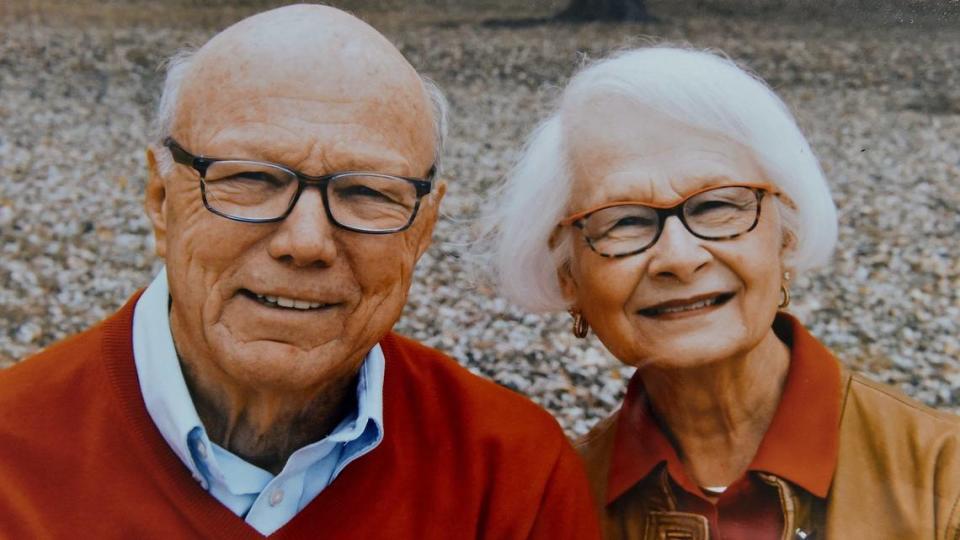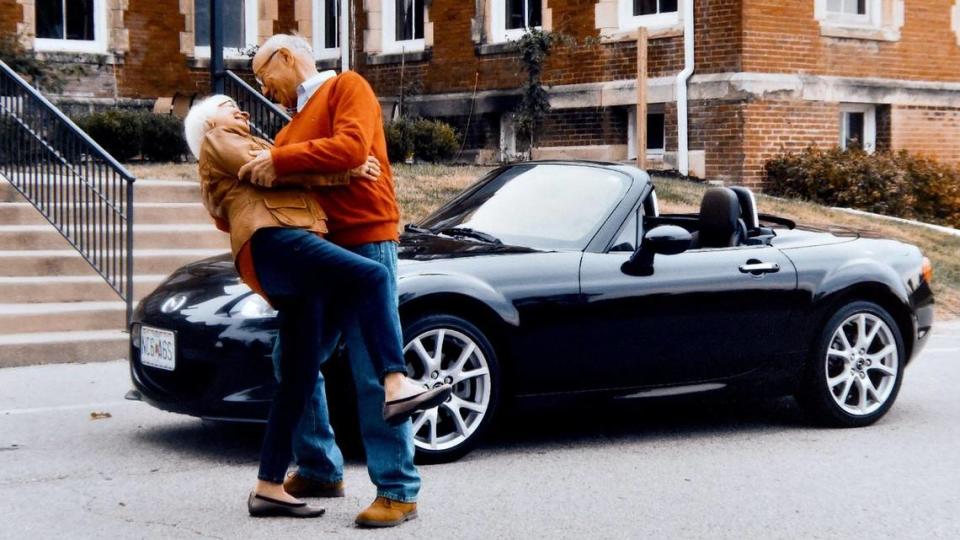‘Take the damn responsibility’: Retired KCPD cop blames police chase for wife’s death
Bob Arnold was expecting to see his wife of 50 years at their Smithville home after she finished a routine outing with her younger sister.
He hugged and kissed her goodbye that morning like always. A few hours later, he got the call from his brother-in-law saying she had been in a terrible wreck on U.S. Highway 50 in Lee’s Summit.
On the way to the hospital, he called his two adult sons. He cried and prayed. His family delivered the news when he arrived: She had died just minutes before.
“It was a terrible time,” Arnold told The Star during a recent interview, fighting back tears as he recounted the events.
As he has spent the past days planning his wife’s funeral, Arnold is angry at the man who was driving recklessly to avoid the law. But he is also angry that the Lone Jack Police Department chased him at speeds near 90 mph down a busy stretch road on a Friday afternoon for what appears to be a relatively minor criminal offense: speeding in a stolen truck. The crash occurred about 12:40 p.m. on June 4, on U.S. 50 just east of Milton Thompson Road, according to the Missouri Highway Patrol.

Arnold does not know the department’s policy on police chases. He says he never heard from anyone at Lone Jack after his wife was killed. But whatever the department’s official procedures, he says they aren’t right.
If they are, why is his wife is dead?
“They absolutely lost their common sense of what they were doing,” Arnold said. “When you’re in that kind of traffic, you’re chasing somebody at that high of a speed, by you continuing on him, it’s going to push him harder to get away.”
He knows better than most what it’s like to be in that situation — because he has been on that side of the chase. For 30 years, he was a sworn officer with the Kansas City Police Department.
In those early days on patrol, before he made detective and investigated organized crime, he chased a couple of runners. But he recalled that even back then, supervisors would get on the radio to call off police pursuits when the circumstances did not support the danger of putting the public at risk.
“And that was in the ‘70s,” he said. “But it’s still happening here all over the United States.”
A stolen truck
Lone Jack Police Chief Bill Forbes declined The Star’s request for an interview. He offered his condolences to the victims of the tragedy, saying he prays for them daily. But Forbes said he could not discuss the events of that day because of “possible litigation and pending charges.”
He did not respond to a follow-up request seeking information about the department’s pursuit policy.
On the day of the crash, Patsy “Pat” Arnold, 73, was heading east on U.S. 50 in her 2020 Ford Escape with her sister, Sherrie Huhs, sitting in the front passenger seat. Somewhere near Milton Thompson Road, Huhs saw the red 1999 Ford Ranger pickup truck driving in the grassy median ahead of them.

She told her sister to watch out. But it didn’t register in time.
In the blink of an eye, the pickup crossed into the opposite direction of traffic and came through the windshield. After the dust settled, Pat Arnold was motionless in the driver’s seat. Huhs screamed at her to get out of the car. Her head was tilted backward. Her eyes were shut.
Pat Arnold was taken by helicopter to Research Medical Center. She was pronounced dead at 2:28 p.m.
Meanwhile, Huhs was taken with relatively minor scrapes and bruises to another hospital, along with the driver of the pickup who had fled police. Another woman whose car was struck went to a hospital.
Huhs later told family she could overhear the driver in the bed next door to her, screaming and crying that he had ruined lives that day.
Citations issued by the Lone Jack Police Department suggest the officer clocked the pickup as driving roughly 89 mph near Lakota Lane and U.S. 50.
In addition to speeding, Lone Jack police cited the driver for failure to yield to an emergency vehicle with its lights and sirens on.
Assisting agencies included the Jackson County Sheriff’s Office and Lake Lotawana Police Department, though Lone Jack, a small department with six officers, was apparently the only agency that chased.
Police Chief Jamie McCain, of Lake Lotawana, said his officers had prepared to use stop sticks — an intervention device used to deflate the tires of a fleeing vehicle — at the request of Lone Jack. But he said they were not used because the driver crossed over into the median before they could be deployed. He said one of his officers chased after the driver on foot.
The sheriff’s office assisted with a K-9 unit and later helped with apprehending the driver.
The Missouri Highway Patrol, which was not involved in the pursuit but led the crash investigation, is sending a recommendation to the Jackson County Prosecutor’s Office that the driver face second-degree murder charge for fleeing police in a stolen vehicle, said Sgt. Bill Lowe, a patrol spokesman.
Police pursuit policies
Some states have laws providing strict guidelines for its law enforcement agencies to follow, such as limiting police pursuits to crimes that pose a substantial public safety risk.
In Missouri, law enforcement agencies are required to develop a policy that at minimum establishes supervision for pursuits, creates procedures for coordinating with other jurisdictions and establishes guidelines for weighing the interest of public safety against justification of a chase.
Policies for engaging in police chases can vary widely from one law enforcement agency to another. In the Kansas City area, with its patchwork of suburban communities intertwined with the city proper, each agency may have its own approach to handling police pursuits.
Kansas City, for example, limits pursuits to situations where the occupants have been involved in a violent felony — such as a murder or kidnapping — or there is an immediate danger to the public.
By contrast, the Missouri Highway Patrol uses a looser equation that measures the potential risk to the public against the benefit of arresting the suspect. Lowe, the patrol spokesman, said troopers are encouraged to terminate in cases where the pursuit is obviously escalating the dangerous driving behavior of a suspect.
And they are required to actually turn in the opposite direction to demonstrate to the driver that the chase is done, he said.
“It’s not a ‘chase until the wheels fall off’ thing,” Lowe said. “It’s, ‘I need to continually evaluate that this is worth it. That this is worth putting somebody else in danger.’ Because they’re dangerous enough for us and anybody around.”
National experts interviewed by The Star say the best policies are typically more conservative.
“You’ll see the better departments have very restrictive policies where they only chase for violent crimes, and other departments pretty much chase for everything, including traffic or tail light infractions,” said Geoffrey Alpert, a professor of criminal justice with the University of South Carolina.
“The point is, I pull you over for a broken taillight, and you flee, and now I’m going to chase you, which makes no sense at all. Because I started to pull you over for a safety violation, and now I’ve made it much worse.”
Dennis Kenney, a professor from John Jay College of Criminal Justice who also has authored studies on the subject of police chases, shares a similar view. He says there are usually only one of three outcomes: A suspect gives up, the car runs out of gas or someone crashes.
The human cost aside, the experts said, police pursuits also bring massive financial liability. Across the U.S., municipalities have made multi-million dollar payouts in civil lawsuits related to fatal police pursuits in cases where uninvolved bystanders were hurt or killed.
Several have happened in the Kansas City metro. In one Grandview case from 2004, the family of a 16-year-old hit by a speeding cruiser was awarded $2.9 million.
Independence paid out nearly $800,000 to settle litigation in one of two strikingly similar wrecks that happened within four years of each other.
‘Stand up’
For more than 50 years, Bob and Pat Arnold never went a day without at least talking to each other by phone.
They met briefly in 1964 when she was visiting a neighbor boy by the farm Bob Arnold grew up on, about five miles north of her hometown of Smithville. Bob Arnold was only on leave from the Navy, and didn’t see her again for five years.
After coming back home and reconnecting with her at a party, he one day found himself looking her up in the book at a Smithville payphone. He called, invited her out, and they were married 7 months later.
Three years ago, she bought a black Mazda Miata because she had always wanted a two-seater sports car. But she found it to be a bit impractical and the husband and wife swapped cars.
Thinking back, Bob Arnold is glad they did. Had she been driving a tiny sports car that day, he said, his sister-in-law may not have been lucky enough to walk away from the crash.

His family would be planning two funerals, he said.
A relative of his has a few friends in Jefferson City. He’s floated the idea of lobbying for a new state law named for Pat Arnold that might offer tighter restrictions on police pursuits across Missouri.
Bob Arnold welcomes it. Whether it’s additional training for the officers or a stricter policy, Bob Arnold says something should be done to prevent another crash from happening to someone else.
“You know, cops are just people. We’re all people. And we make mistakes, but we got to live with those mistakes. If that’s against the law or against the procedure, be responsible. Stand up and take the damn responsibility if you did something wrong,” he said.
“Admit it and let’s go on. And let’s fix it so no more Patsy Arnolds have to die.”

